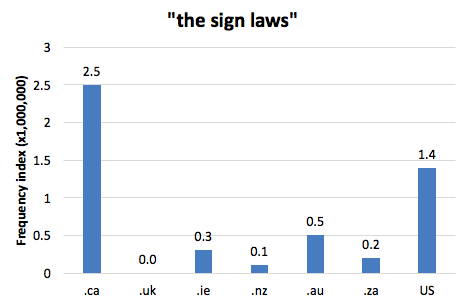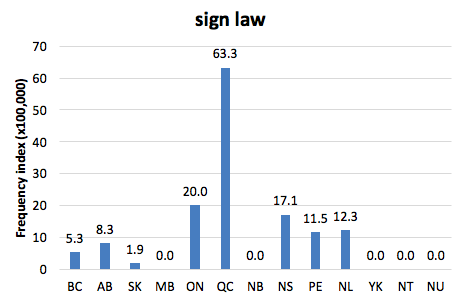DCHP-2
sign law DCHP-2 (October 2016)
n. — Quebec, Politics, French relations
provincial regulations in Quebec that mandate the use of French on signs.
Type: 1. Origin — The term sign law refers to a series of regulations concerning the use of French on signs in Quebec, starting with Bill 22 (see the 1975 quotation). The Parti Quebecois, elected in 1976, enacted Bill 101 in 1977. The Bill made the use of French on signs mandatory. In 1983, the Supreme Court judged that Bill 101's sign law was contrary to freedom of expression. In 1988, the Quebec Liberals compromised by enacting Bill 178, which stipulated that signs may "be both in French and in another language, provided they are intended only for the public inside the establishments and that French is markedly predominant" (see Canadian Encyclopedia, s.v. "Quebec Language Policy", and "Bill 178"). In 1993, Bill 86 was passed; it modified the previous Bills, stating that "public signs and posters and commercial advertising must be in French. They may also be both in French and in another language provided that French is markedly predominant" (see Canadian Encyclopedia, s.v. "Bill 86"). Chart 1 shows the Canadian dimension even in form alone, with twice as many hits as in the US. Chart 2 shows, the dominance of the term, which is of national scope as the French-English relations affect the country as a whole, in Quebec.
See also COD-2, s.v. "sign law", which is marked "Cdn informal".See also: language police tongue trooper notwithstanding clause Bill 101 Charter of the French Language
References:
- COD-2
- Canadian Encyclopedia "Bill 86" Accessed 28 Jul. 2016
- Canadian Encyclopedia "Bill 178" Accessed 28 Jul. 2016
- Canadian Encyclopedia "Quebec Language Policy" Accessed 28 Jul. 2016
Images:

Chart 1: Internet Domain Search, 26 Jul. 2016
Chart 2:Regional Domain Search, 26 Jul. 2016